Still in Solidarity!
Report on the anti-repression campaign “ You Can’t Evict Solidarity” and perspectives on solidarity work on the “Balkanroute” in January 2018
The campaign “You Can’t Evict Solidarity” is made up of different people living in Germany and Greece who are active in anti-racist and other political struggles. Many of them were active on the Balkanroute, in Greece or on the outer borders of the European Union in the past 2 ½ years. They started the campaign in the summer of 2016 to promote solidarity beyond borders with (migrants’) squats and housing struggles in Greece and everywhere.
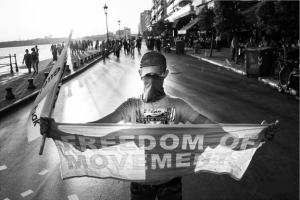
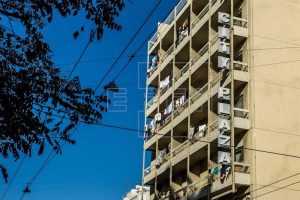
Start of the Campaign in Summer 2016
In July 2016, the Syriza government and the Greek church evicted the three squats “Orfanotrofeio”, “Nikis”, and “Hurriya” in Thessaloniki, Greece, that were established and inhabited by migrants and activists. During the evictions and at protests following in the next days, more than 100 people were arrested. Many migrants previously living in the squats were brought to military camps.
Several days after, in July and August, 2016, the first were convicted with high fines and probational jail sentences. Many of the people involved in the “Can’t Evict Solidarity” campaign were at No Border Camp Thessaloniki, which had happened previous to the evictions. After first meeting there, we got together again afterwards and decided together with people affected by the evictions to collect money for the oncoming legal costs, to raise awareness for the evictions, and continue supporting migrant housing struggles. One of the goals of the campaign is therefore to support the creation of other spaces of solidarity and communal life in other places. The importance of this is shown as well by the recent cases of repressions against the solidarity movement in Greece.
What has since happened in Greece…
While the situation for refugees in Greece has overall become worse in the past years and the situation of people living in Greece is marked by the inhuman austerity policy of the EU, 60.000 migrants are stuck there after the militarisation and closing of the Balkanroute. The migration policy of the EU with the EU-Turkey deal and the Greek Syriza government force continuous militarisation and repression against refugees and activists. The crowded camps in Greece usually lack primary health care, food, and sanitary devices. Many camps are situated in remote, former industrial areas, or are made up of tents. Add to this the brutal treatment by police, military, and private security.
Meanwhile, many camps simply resemble prisons. Especially striking are the so-called “Hot-Spots” on the islands of Chios, Lesbos, and Samos, that the EU-Turkey deal turned into a dead end for refugees. Currently, over 15.000 people are stuck on the islands – more than 8.000 have to live under inhumane conditions in Camp Moria on Lesbos, which was constructed for 1.500 people. Again and again, people trapped there have protested with hunger strikes against the conditions in these “open prisons” and demanded the right to move. Most of the protests were stopped violently, the protestors were imprisoned for months or deported. Currently the Petrou Ralli 8 or the Moria 35 are two of such cases, that we are in solidarity with.
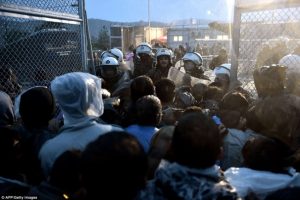
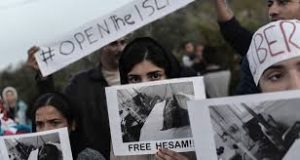
In response to these circumstances, houses are squatted not just in Thessaloniki, but also in Athens, other greek cities and on the islands to create the possibility for a self-determined life for refugees and other activists, as an alternative to state-run camps, state violence, and beyond sexist, racist, and nationalist categories. The houses provide spaces for political networking, self-organisation against the EU border regime, and enable solidarity and mutual support, also of the greek society. They present effective alternatives to state and capitalist backlash.
The most well known of these squat would be the former “City Plaza” Hotel in Athens, that since 2015 is home to a community over 400 people living together in solidarity. There are several of these free spaces here in Germany and along the Balkanroute as well, like the OM10 in Göttingen, Germany, or the formerly squatted warehouses in Belgrade, Serbia.
Instead of improving the inhumane conditions refugees have to endure, the Greek government continues their strategy of repression in, a desperate attempt to smash the powerful international solidarity movement. Several times, the government gave order to evict squats on Lesbos, then the refugee squat “Alkiviadou” and the squat “Villa Zografou” in Athens in March 2017, arresting 200 people who lived there. All of this under the instruction of Nikos Toskas, the Greek minister for public order, who wants to speed up the eviction of squats used to house refugees, suggesting a threat to further spaces such as the “City Plaza”. In April, the eviction of a further solidarity squat, the “Albatros”, which was started after the evictions in the summer of 2016, followed in Thessaloniki. Alongside all of the evictions, protests were happening in Greece as well as other countries, sometimes with thousands of participants.
And what is happening along the Balkanroute?
Generally, we’re seeing an increase of repression against refugees and migrants, against supporters, and against alternatives to state-controlled migration policy not just in Greece but everywhere in Europe. This was the case already before the “summer of migration” in 2015, but now the borders between the Balkan states, most prominently the Serbian-Hungarian border, are heavily militarised. Equipped with modern surveillance technology, police and military track refugees, forcefully stop them from crossing the borders, and sometimes unlawfully incarcerated for months. At times, refugees are shot, what happened at the border between Bulgaria and Turkey.
In parallel, repression against refugees has increased in the courtrooms, as in the case of Ahmed H., who was arrested alongside eleven other refugees in Röszke, Hungary, in September 2015 (the “Röske 11”), and in November 2016 was sentenced to 10 years in prison. He and the others were randomly taken out of a crowd protesting at the Serbian-Hungarian border and convicted of terrorism and illegal border-crossing. Even though the sentence was contested at a higher court level, Ahmed remains under arrest and is waiting for his appeal, which is expected for March 2018.
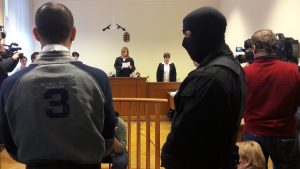
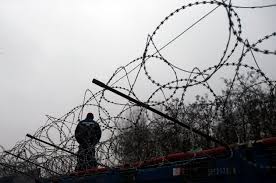
Still, many people are taking this dangerous route and in turn get stuck in the so-called “hotspots” on the Greek islands or mainly in Serbia, live on the streets or are illegally deported. Houses squatted out of necessity are evicted, such as the warehouses in Belgrade in the spring of 2017, and activists working in solidarity are arrested as traffickers, as in Croatia in the fall of 2016. Because of the militarisation of the borders and the criminalisation of support for refugees through new laws, e.g. long prison sentences for “human trafficking”, it became almost impossible for activists to directly aid people on their way.
However, resistance is still visible. Again and again, refugees are protesting against these conditions and for open borders and their right to move. In 2016, a protest march from Belgrade to the Croatian Border took place, and just last December, a protest camp was established by refugees at the Serbian-Croatian border near Sid. Most of the time, these acts of resistance are quickly brought to an end by police and military, and the protesters spread across state-controlled camps all over the country.
What did we do to support the resistance and what is currently happening?
The campaign was started in the fall of 2016 and got a lot of support through people organising solidarity parties in many cities, donating money, and raising public awareness. Several thousand Euros were collected already and sent to people affected by repression in Greece. Money was spent to pay lawyers and legal fees, and for publicity around these issues (leaflets, stickers, posters).
In Thessaloniki, the first convictions of the squatters of “Nikis” in July 2016 were followed in 2017 by court dates for the 82 activists of the “Hurriya” and “Orfanotrofeio” squats. The “Orfanotrofeio” activists had been accused of “disturbing the peace of the church” because of an action happening during a ceremony but were cleared of all charges in the appeal trial, and in addition, five further squatters of the “Orfanotrofeio” were cleared of all charges on May 31. The trial against the 58 squatters of “Hurriya” was postponed already several times and is now set for September 2018. In December 2017, all nine squatters of “Albatros” were convicted to 6 month in prison on probation for 3 years, they are now appealing this decision.
We accompanied all of these trials with reporting and otherwise, and supported also people affected by new cases of repression. In addition, several people are facing charges after the evictions of “Alkiviadou” and “Villa Zografou” squats in Athens. We also financially supported the “Steki” social center for migrants in Thessaloniki, that while not being a squat, was endangered by closing through the Greek state, and the squatters of the “Turtle Corner” squat in Thessaloniki, who were convicted after the eviction that already happened in the spring of 2016. At the same time, the current developments in Greece and the ongoing court cases show that the campaign remains necessary and that we have to continue to organise solidarity and support.
What does the future of the campaign look like?
We met in December 2017 to discuss the (re)orientation of the campaign. Since state repression against refugees increases all along the Balkanroute and the outer EU borders, not just in Greece and not stopping at borders, and since there are simultaneous big solidarity networks across all borders, we will expand the campaign. The money collected so far will be used to support the remaining trials and people not yet convicted in Greece, and to enable publicity work. We want to increase international anti-repression work to support people struggling in anti-racist issues at the EU-borders. We want to raise awareness for their struggles and call for donations. People in need of support, as well as people interested in helping with the campaign are invited to contact us!
More information on the campaign and possibilities to get in contact can be found online at
https://cantevictsolidarity.noblogs.org/ (German) and
https://cantevictsolidarityenglish.noblogs.org/ (English).
Account for donations:
Rote Hilfe e.V./ OG Hannover
IBAN: DE42 4306 0967 4007 2383 57
BIC: GENODEM1GLS
Reason for Payment: Cant evict Solidarity
YOU CAN’T EVICT A MOVEMENT – YOU CAN’T EVICT SOLIDARITY!
